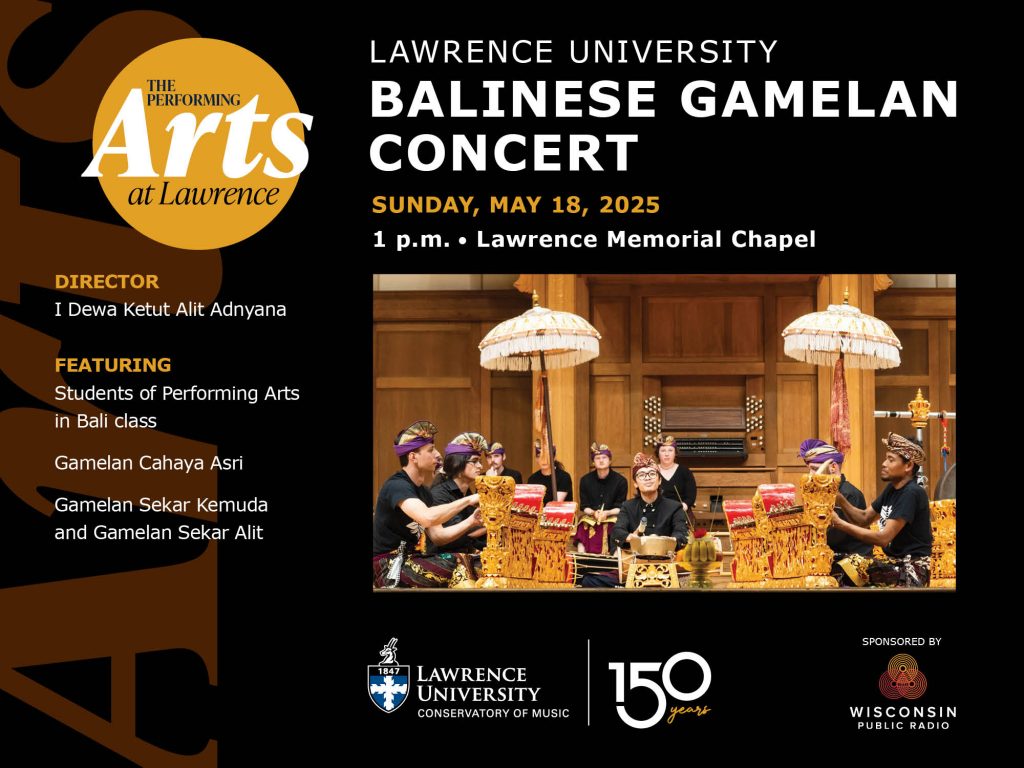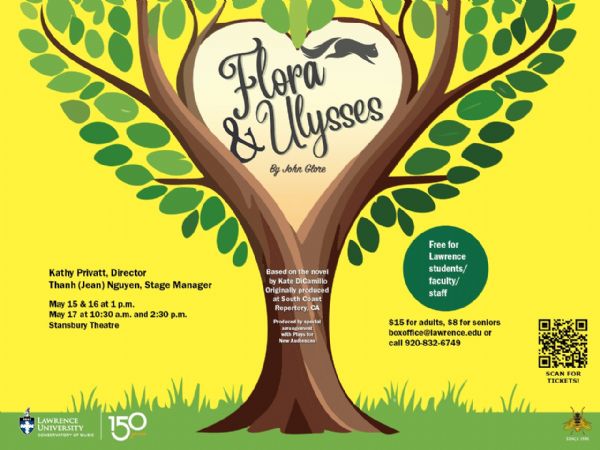| Monday, May 12 | Cooking for COTS 12:30-3:30 p.m. | Spirit Space Kitchen |
| Tuesday, May 13 | Pancake Breakfast 9 a.m.-Noon | Beta Theta Pi House |
| Wednesday, May 14 | Photobooth & Scrapbooking 4-6:30 p.m. | Diversity Center |
| Thursday, May 15 | Music Jeopardy & Treats 1-4 p.m. | Conservatory Pickleball 4-6 p.m. | Wellness Center Gym |
| Friday, May 16 | Mini Golf 12-2 p.m. | Outside Warch Lipsync 6-7 p.m. | Wriston Amphitheater |
| Saturday, May 17 | Animal Yoga 3 p.m. & 4 p.m. | Wellness Center Dunk-a-Delt TBD | Quad |
Outdoor Movie Screening
Saturday, May 17 | 8 p.m.
The Quad
Join the Motion Picture Club, Lawrence International, and the LU Jazz & Gender Equity Initiative for the first-ever outdoor movie screening! Enjoy Disney’s The Princess and the Frog and a performance from LU jazz musicians.
Arrive between 7:45-8 p.m.
Camping on Main Hall Green
Saturday, May 17 | 8 p.m.
Main Hall Green
Join ORC for a campfire, s’mores, and an outdoor movie before spending the night camping on Main Hall Green!
Meet outside Trever Hall at 8 p.m. for any gear you need, including tents, sleeping bags, hammocks, headlamps, etc. If you can’t make it at 8 p.m. but would still like to attend, email Mari Rummel (rummelm@lawrence.edu) or Savannah Betterley (betterls@lawrence.edu).
Community Blood Drive
Wednesday, May 14 | 11 a.m.-5 p.m.
Outside the Wellness Center
You can help save a life by donating blood!
Sign up on campus May 12 from 11-1 p.m. at Warch Campus Center, or go to save3lives.org. The mobile bus unit will be parked outside of the Wellness Center on May 14. Drop-in appointments may be available, but appointments are preferred.
Performing Arts Series: Balinese Gamelan Concert
Sunday, May 18 | 1 p.m.
Memorial Chapel

Gamelan Cahaya Asri, Gamelan Sekar Kemuda, Gamelan Sekar Alit, and students of the Performing Arts in Bali class present traditional and contemporary gamelan music from Bali.
Free and open to the public!
Can’t make it to the Lawrence Memorial Chapel? Catch the live webcast here:
https://vimeo.com/lawrenceuni
Biofest
A culmination of the Biology Senior Experience at Lawrence
Friday, May 16 | 2-7 p.m.
Warch 324-Somerset Room
At this event, senior biology, biochemistry, and neuroscience students will present their self-designed Senior Experience projects to the Lawrence University community.
This is a come-and-go event where you can drop in and attend for as long as you are able. Students will be presenting posters as well as other products to display their senior experience projects.
PLUS Mock Interviews
Tuesday, May 13 | 5-7 p.m.
Diversity Center
Join us for a professional development event where students will participate in mock interviews to practice their skills and receive real-time feedback from campus and community leaders. This is a valuable opportunity to prepare for future job opportunities in a supportive environment. All materials provided!
About PLUS
The Program for Leadership of Underrepresented Students (PLUS) is designed to assist incoming students from underrepresented backgrounds with academic and social support through peer mentoring to create high levels of achievement and an overall positive college experience.
Play Forward Field Day
Sunday, May 18 | 2-6 p.m.
Main Hall Green
Presented by ACU, Alianza, B2B, BSU, and CODA
Don’t miss this chance to help fundraise for a local organization while having fun and a chance to win great prizes! Enjoy games, snacks, snow cones, flag football, and a dunk tank, all while listening to good music.
There will be a raffle:
- 1 ticket = $2
- 3 tickets = $5
- 10 tickets = $15
Participants are eligible to win one item per prize tier! Enter for your chance to win big while supporting a local organization.
Tier 1
- PlayStation 5
- iPad
Tier 2
- JBL Speaker
- Sony Headphones
Tier 3
- Stanley Cups
- Owala Bottles
- Hammocks
- Portable Chargers
- Mini Fans
Zoo Days
Saturday, May 17 | 11 a.m.-3 p.m.
Main Hall Green
Organized by our student events organization (SOUP), Lawrentians from all over campus congregate on Main Hall Green to play games and enjoy an afternoon of fun in the sun. The best part about Zoo Days is that all the money raised by student clubs and organizations goes toward nonprofit causes.
Spring Term Play: Flora and Ulysses
Thursday, May 15 | 1 p.m.
Friday, May 16 | 1 p.m.
Saturday, May 17 | 10 a.m. and 2:30 p.m.
Stansbury Theatre

by John Glore – Based on the novel by Kate DiCamillo
Kathy Privatt, Director
This play for young (and old) audiences is about a squirrel who gets sucked up in a vacuum cleaner and comes out with superpowers to understand humans . . . and open their hearts.
Audiences from area elementary schools will join us on May 15-16 for a fully produced experience!
